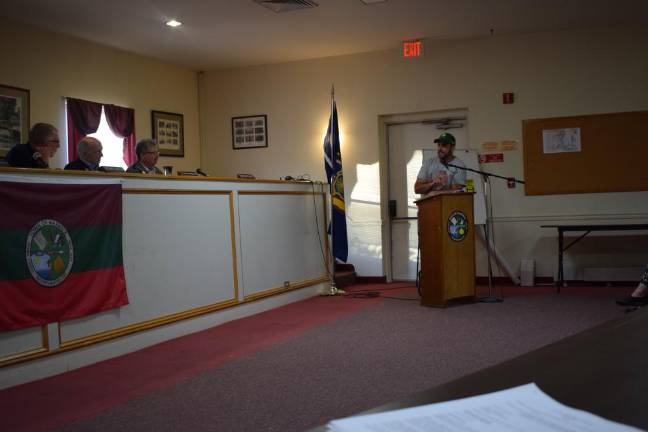Early rising roosters rouse conflict at town board hearing
Warwick. A proposed zoning change would require people with roosters in residential zones to be rid of them. But for some, roosters have important roles as pets, hen protectors and tick eaters.


Concern about how roosters should be situated in residential zoning codes caused conflict at a July 14 Town of Warwick Board hearing.
The hearing addressed zoning changes regarding food trucks, redefining principal use, farm markets, allowable number of animals and removal of some animals, primarily roosters.
One suggested zoning change involved prohibiting roosters from being kept on residential lots because of their noisiness, especially early in the morning. This zoning change would not affect farms or large parcels, according to Town Supervisor Michael Sweeton.
When the town board opened the floor for comments on the issue, speakers defended the rightness of keeping roosters on residential property. Some expressed concern that they had learned about the rooster hearing only hours earlier.
“I was told yesterday [July 14, 2022] by the building department secretary that the rooster zoning ordinance was already approved. She backtracked and said that it was imminent when I asked for the code in writing for our third ZBA meeting regarding our coop permit, scheduled for July 25,” said Warwick resident Dana Welch. “In our conversation, she also did not notify me of the meeting today.”
The zoning change proposal resulted from noise complaints about roosters. The change would require residents who own roosters to get rid of them, according to Welch.
“I have lived in the Town of Warwick for 22 years. For those 22 years, roosters and hens have been legal in the town,” said Welch. “Now I’m being told that my beloved pet has to go. What’s next? Hens?”
“Farming is encouraged in this town. With that in mind, and thinking of properties that would be excluded from farming by eliminating roosters, that can be quite concerning,” said James McAteer. “I just want to make sure the board considers the entirety of the properties that could be affected and how many complaints there have been.”
Another issue that emerged was that when people buy chicks from local or chain stores, their sex is not identified, Welch said. They would not know if they had a rooster or hen and would have to get rid of an animal they spent time raising. Roosters would be killed if residents had to get rid of them, according to McAteer.
“That’s the impact,” he said.
“It’s starting to sound like there’s a neighbor that has irritated another neighbor. I’ve seen this in other towns,” said Harold Hansen. “I think this is a bad way to go.”
Hansen also owns hens and one rooster and would be affected by the zoning change.
A benefit of having hens and roosters on a property is that they take care of the bug population, especially ticks, said Chris Kimiecik
“Chickens love ticks,” he said. “I like to let my chickens run free range. “I don’t want someone coming and spraying my property with chemicals for ticks. Without a rooster, you lose your chickens very quickly.”
According to Kimiecik, a rooster is needed to protect the flock, and only one rooster is needed to do so.
One resident supported the change, but, according to Sweeton, his situation was different. Robert Ginley was concerned about someone’s attempt to establish a commercial fowl breeding operation on a residential lot, which is not permitted by the law.
No decision was made about roosters, and all comments made by residents will be taken into consideration, Sweeton said. Comments from county officials and the town planning board will also be considered before a final decision. August 18 would be the earliest possible date for a decision to be made.
I have lived in the Town of Warwick for 22 years. For those 22 years, roosters and hens have been legal in the town,” said Welch. “Now I’m being told that my beloved pet has to go. What’s next? Hens? - Dana Welch, Town of Warwick resident